Manurhin MR 73
The Manurhin MR73 is a French-manufactured, high-end double-action/single-action revolver chambered in .38 Special/.357 Magnum. The MR73 is manufactured by Manurhin and is available in 2.5", 2.75", 3", 4", 4.25”, 5.25", and 6" barrel lengths.
| Manurhin MR 73 | |
|---|---|
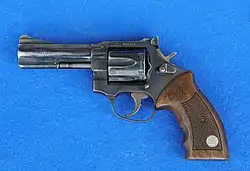 Manurhin MR 73 4" in .357 Magnum caliber. | |
| Type | Revolver |
| Place of origin | France |
| Service history | |
| Used by | See Users |
| Production history | |
| Designed | 1973 |
| Manufacturer | Manurhin |
| Variants | Gendarmerie,[1] Sport,[2] Match[3] |
| Specifications | |
| Mass | 880 g (31.0 oz) (2.5") 950 g (33.5 oz) (4") 1,030 g (36.3 oz) (5.25") |
| Length | 195 mm (7.7 in) 2,055 mm (80.9 in) 233 mm (9.2 in) |
| Barrel length | 2.25 in (57.2 mm) 2.75 in (69.9 mm) 3 in (76.2 mm) 4 in (101.6 mm) 4.25 in (108.0 mm) 5.25 in (133.4 mm) 6 in (152.4 mm) 8 in (203.2 mm) 10 in (254.0 mm) |
| Cartridge | |
| Action | Double-action |
| Feed system | 6-round cylinder |
| Sights | Iron sights, both fixed and adjustable |
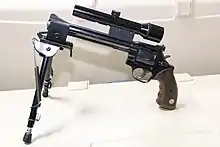
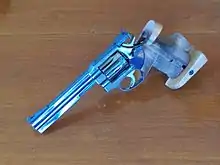
Usage
The MR 73 was standard issue with France's Gendarmerie and in some police units including Special Weapons and Tactics teams (RAID, GIGN and comparable units).
The GIGN selected the MR 73 in part for its ability to almost indefinitely withstand 150 rounds of full-power ammunition during daily range practice. These teams also use MR 73s with Bushnell Magnum Phantom 1.5× telescopic sights and 8" and 10" barrels for tactical purposes. Over one million rounds were allegedly fired through one example.
Specifications
Every MR 73 is match grade accurate, shipped with its own factory test target fired at 25 m (27.3 yd). Averaging 15 rounds, no group over 20 mm (0.79 in) diameter with selected ammunition is allowed.
The MR 73 has an adjustable trigger weight in both double-action and single-action modes, a feature found in other high-end revolvers such as Korth and Janz. These adjustments do not alter the strength of the main spring, ensuring reliable primer ignition. This is due to the use of roller bearings in the trigger mechanism along with extensive hand fitting and polishing of components during assembly. The MR73 requires more than 12 hours of hand-fitting at the factory, making it about 50% more expensive than competing U.S.-manufactured brands.[3]
The revolver can be converted to 9×19mm Parabellum with a supplied replacement cylinder, however, 9×19mm Parabellum under French law has the status of ammunition of war. Thus, from the early 1980s, production was limited to the versions in .38 Special/.357 Magnum.
Cylinder chambers are finished with an impact process that makes them glass-smooth and extremely hard. The factory proof-fires each cylinder chamber with .357 Magnum ammunition generating 30% more pressure than the C.I.P. maximum allowable pressure for the Magnum cartridge. The factory guarantees that the cylinder will not burst or show any bulging or deformation with .357 Magnum ammunition developing double the C.I.P. 300.00 MPa (43,511 psi) Pmax piezo pressure, meaning the cylinder can withstand 600.00 MPa (87,023 psi), or 43.5 tons per square inch).[5]
The frame, cylinder, and barrel of the MR 73 are made from ordnance-certified, alloyed steel. Barrels are manufactured by cold-hammering. The rifling is formed during the forging process, eliminating the need to cut the rifling as a separate manufacturing step. This creates an extremely hard and microscopically smooth internal barrel surface.[6]
MANURHIN S.A; had made a counterweight to use with Manurhin MR 73 5"1/2 and greater length and high quality walnut pistol grip.
Trauch French armurier had created and sold a very efficiency polymer pistol grip quick draw.
HKS make a speedloader (Model 10A) to use with .38, .357, and 9mm caliber cylinder.
Variants
A sporting variant called the MR 32 Match is produced in .32 S&W Long. It was first produced in 1985.[7] Other sporting variants are the MR 38 Match chambered in .38 Special and the MR 22 Match chambered in .22 Long Rifle. The Match versions feature only a single action trigger and have an extended rearward rise. This allows the aiming length to be increased without increasing the total length of the weapon, which would have made it exceed the maximum dimensions authorized in certain competitions.
A variant called the Gendarmerie features adjustable rear sights and larger front sights.
Other variants
- Special Police F1/MR 88
- MR 93
- MR 96
Users
 Austria: Used by EKO Cobra.[8]
Austria: Used by EKO Cobra.[8] Burkina Faso[9]
Burkina Faso[9] Cameroon[9]
Cameroon[9] Central African Republic[10]
Central African Republic[10] Chad[9]
Chad[9] France: Used by GIGN and RAID.[2]
France: Used by GIGN and RAID.[2]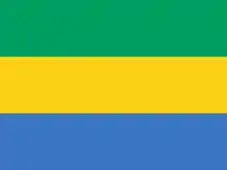 Gabon[9]
Gabon[9] Ivory Coast[9]
Ivory Coast[9] Malaysia[9] RELA Corps.
Malaysia[9] RELA Corps. Mali: People's Movement for the Liberation of Azawad[11]
Mali: People's Movement for the Liberation of Azawad[11]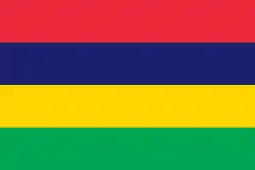 Mauritius[9]
Mauritius[9] Niger: police forces[12]
Niger: police forces[12]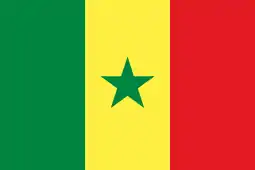 Senegal[9][13]
Senegal[9][13] Seychelles[9]
Seychelles[9]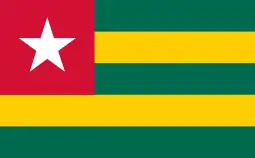 Togo[9]
Togo[9]
References
- Hogg, Ian (1989). Jane's Infantry Weapons 1989-90, 15th Edition. Jane's Information Group. p. 17. ISBN 0-7106-0889-6.
- http://world.guns.ru/handguns/hg66-e.htm
- http://www.recguns.com/Sources/IIIB2c.html
- "Archived copy". Archived from the original on 2011-07-08. Retrieved 2009-06-30.CS1 maint: archived copy as title (link)
- id.
- "Archived copy". Archived from the original on 2001-02-22. Retrieved 2009-07-05.CS1 maint: archived copy as title (link)
- McNab, Chris (2004). The Great Book of Guns: An Illustrated History of Military, Sporting, and Antique Firearms. Thunder Bay Press. p. 191. ISBN 1-59223-304-X.
- Magazine LAW and ORDER, July 2009
- Hogg, Ian (1989). Jane's Infantry Weapons 1989-90, 15th Edition. Jane's Information Group. pp. 826–836. ISBN 0-7106-0889-6.
- https://sites.google.com/site/worldinventory/wiw_africa/https-sites-google-com-site-worldinventory-wiw_af_centralafricanrepublic
- Small Arms Survey (2005). "Sourcing the Tools of War: Small Arms Supplies to Conflict Zones" (PDF). Small Arms Survey 2005: Weapons at War. Oxford University Press. p. 166. ISBN 978-0-19-928085-8.
- "World Infantry Weapons: Niger". 2007–2014. Archived from the original on 24 November 2016.
- Jones, Richard (2009). Jane's Infantry Weapons 2009-2010. Jane's Information Group. p. 902. ISBN 978-0-7106-2869-5.
External links
| Wikimedia Commons has media related to Manurhin MR73. |